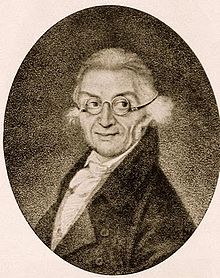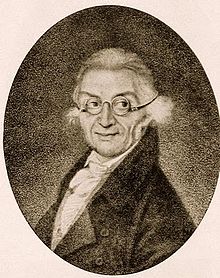Johann Wilhelm Hässler
Johann Wilhelm Hässler (March 29, 1747 – March 22 (other sources, March 29), 1822), was a German composer, organist and pianist. Hässler was born in Erfurt. He first studied under his uncle Johann Christian Kittel, who was an organist at Erfurt. His first post was as organist of the local Barfüßerkirche in around 1762. His father died in 1769 and from then on he also managed the family fur business, though he still managed concert tours of Germany in the early 1770s, then in other places in Europe in the 1780s and 1790s. On 15 April 1789 he entered an organ competition with Wolfgang Amadeus Mozart in Dresden during Mozart’s Berlin journey. On these tours he also came into contact with Johann Nikolaus Forkel, Johann Adam Hiller, Franz Benda, and Carl Philipp Emanuel Bach. He spent 1790 to 1792 in London and then moved to Saint Petersburg before settling in Moscow in 1794, where he worked as a prominent music teacher and composer. He remained there until his death.

See More :
Johann Wilhelm Hässler studied the organ with his uncle Johann Christian Kittel and at fifteen years of age was ready to take up the post as organist at the Barfüsserkirche in his home town Erfurt. When his father died in 1769, Hässler took over the family fur business, but he also found time to write his own keyboard works and to start travelling widely as a performer, meeting C. P. E Bach and several other celebrities: in 1789 he entered an organ competition with Mozart during the latter’s Berlin journey. He spent two years in London before relocating to Russia in 1792, settling first in St. Petersburg, then in Moscow, where he enjoyed great popularity as a pianist, composer and teacher. He published several piano sonatas and many other pieces for piano, of which the best known is the Grand Gigue in D minor op. 31, a popular bravura piece during the early 19th century.
Mozart about Hässler: “Hässler´s chief excellence on the organ consists in his foot-work, which…is not so very wonderful. Moreover, he has done no more than commit to memory the harmony and modulations of old Sebastian Bach and is incapable of executing a fugue properly…Thus he is far from being an Albrechtsberger.”
| Title | Key | Year | Level | |
|---|---|---|---|---|
All pieces: |
||||
| Ecossaise | G Major | – | 2 | |
| Tempo di minuetto | C Major | – | 2 | |
| Moderato Op. 38 No. 5 | C Major | – | 1 | |
Source by: pianosintheparks.com




Leave a Reply
Want to join the discussion?Feel free to contribute!